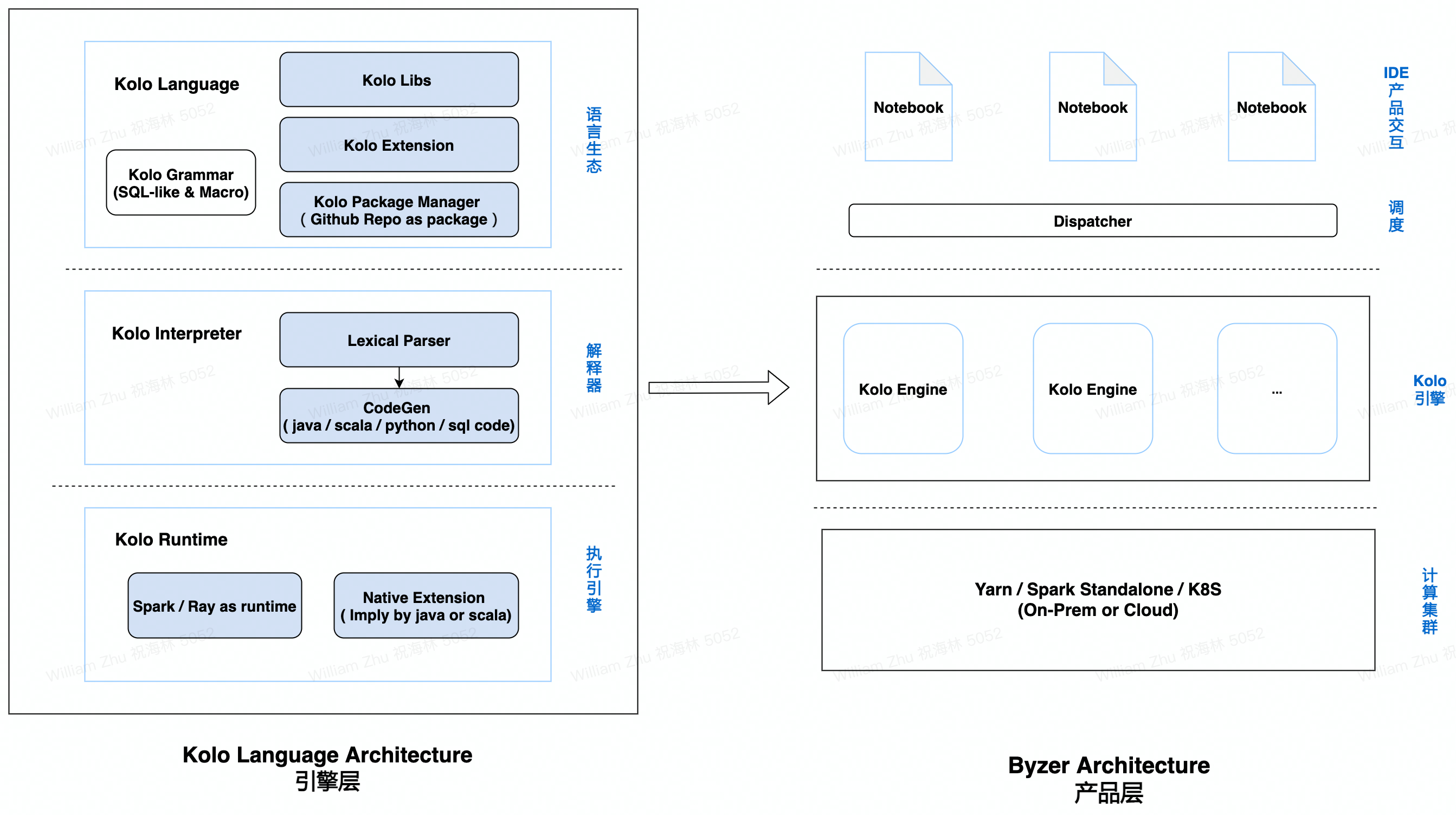- Kolo-Lang
- Official WebSite
- VSCode Extension(MacOS、Linux)
- Docker Sandbox
- Download Kolo
- Building a Distribution
- Deploying
- How to contribute to Kolo-Lang
- Contributors
- WeChat Group
Kolo (former MLSQL) is a low-code, open-sourced and distributed programming language for data pipeline, analytics and AI in cloud native way.
Deisgn protocol: Everything is a table. Kolo is a SQL-like language, to simplify data pipeline, analytics and AI, combined with built-in algorithms and extensions.
We believe that everything is a table, a simple and powerful SQL-like language can significantly reduce human efforts of data development without switching different tools.
load hive.`raw.stripe_discounts` as discounts;
load hive.`raw.stripe_invoice_items` as invoice_items;
select
invoice_items.*,
case
when discounts.discount_type = 'percent'
then amount * (1.0 - discounts.discount_value::float / 100)
else amount - discounts.discount_value
end as discounted_amount
from invoice_items
left outer join discounts
on invoice_items.customer_id = discounts.customer_id
and invoice_items.invoice_date > discounts.discount_start
and (invoice_items.invoice_date < discounts.discount_end
or discounts.discount_end is null)
as joined;
select
id,
invoice_id,
customer_id,
coalesce(discounted_amount, amount) as discounted_amount,
currency,
description,
created_at,
deleted_at
from joined
as final;
set allColumns = "all,wow";
!if ''' split(:allColumns,",")[0] == "all" ''';
select * from final as final2;
!else;
select id,invoice from final as final2;
!fi;
select * from final2 as output;https://mlsql.tech [New official website is coming soon]
More document about kolo-lang vscode extension(Chinese version)
export MYSQL_PASSWORD=${1:-root}
export SPARK_VERSION=${SPARK_VERSION:-3.1.1}
export MLSQL_VERSION=${MLSQL_VERSION:-2.2.0-SNAPSHOT}
docker run -d \
-p 3306:3306 \
-p 9002:9002 \
-p 9003:9003 \
-e MYSQL_ROOT_HOST=% \
-e MYSQL_ROOT_PASSWORD="${MYSQL_PASSWORD}" \
--name mlsql-sandbox-${SPARK_VERSION}-${MLSQL_VERSION} \
mlsql-sandbox:${SPARK_VERSION}-${MLSQL_VERSION}
Then you can visit http://127.0.0.1:9002 .
- The latest stable version is release-2.1.0
- You can download from Kolo Website
- Spark 2.4.3/3.1.1 have been tested
Naming Convention
mlsql-engine_${spark_major_version}-${mlsql_version}.tgz
## Pre-built for Spark 2.4.3
mlsql-engine_2.4-2.1.0.tar.gz
## Pre-built for Spark 3.1.1
mlsql-engine_3.0-2.1.0.tar.gz- JDK 8+
- Maven
- Linux or MacOS
## Clone the code base
git clone https://github.com/byzer-org/kolo-lang.git
cd kolo-langexport MLSQL_SPARK_VERSION=2.4
./dev/make-distribution.shexport MLSQL_SPARK_VERSION=3.0
./dev/make-distribution.sh## Chinese analyzer is enabled by default.
export ENABLE_CHINESE_ANALYZER=false
./dev/make-distribution.sh <spark_version>- Download or build a distribution
- Install Spark and set environment variable SPARK_HOME, make sure Spark version matches that of MLSQL
- Deploy tgz
- Set environment variable MLSQL_HOME
- Copy distribution tar ball over and untar it
4.Start Kolo in local mode
cd $MLSQL_HOME
## Run process in background
nohup ./bin/start-local.sh 2>&1 > ./local_mlsql.log &- Open a browser and type in http://localhost:9003, have fun.
Directory structure
|-- mlsql
|-- bin
|-- conf
|-- data
|-- examples
|-- libs
|-- README.md
|-- LICENSE
|-- RELEASEIf you are planning to contribute to this repository, please create an issue at our Issue page even if the topic is not related to source code itself (e.g., documentation, new idea and proposal).
This is an active open source project for everyone, and we are always open to people who want to use this system or contribute to it.
For more details about how to contribute to the Byzer Org, please refer to How to Contribute
Made with contrib.rocks.
扫码添加K小助微信号,添加成功后,发送 mlsql 这5个英文字母进群。



